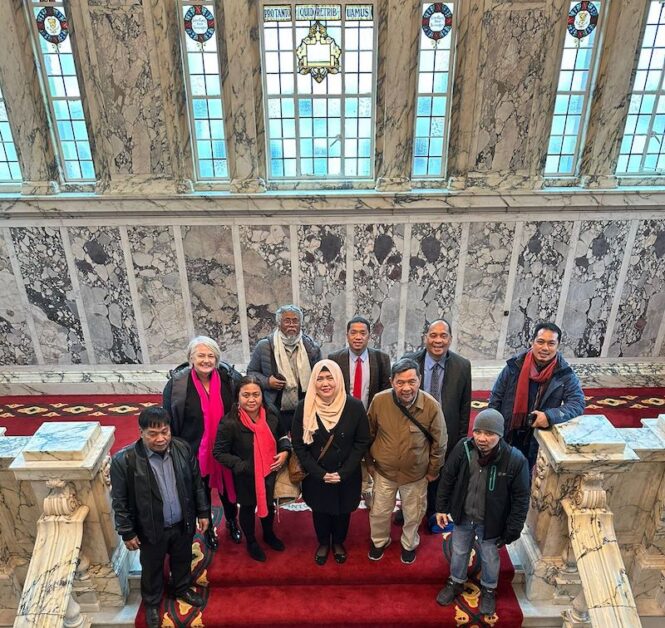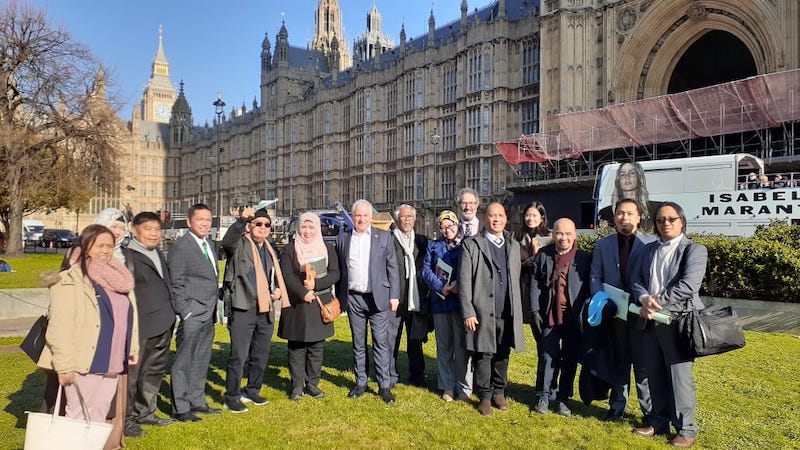DAVAO CITY (MindaNews / 05 March) – Several leaders of the Bangsamoro Autonomous Region in Muslim Mindanao (BARMM) recently visited Northern Ireland to learn from peacemakers and politicians on the Northern Ireland peace process
Members of Parliament and other officials of the BARMM, among them members of the Moro Islamic Liberation Front (MILF) and Moro National Liberation Front, civil society leaders from the Moro, Lumad (Indigenous Peoples) and women visited Northern Ireland on February 10 to 19.
Facilitated by international peacebuilding organization, Conciliation Resources, the learning trip “aims to support the transition to peace in the Bangsamoro by learning from the successes and challenges of the Northern Ireland peace process.”
 Photo taken at the Belfast City Hall after meeting with Belfast Mayor Tina Black of Sinn Fein. Photo courtesy of Conciliation Resources Philippines
Photo taken at the Belfast City Hall after meeting with Belfast Mayor Tina Black of Sinn Fein. Photo courtesy of Conciliation Resources Philippines
Northern Ireland is approaching the 25th anniversary of the Good Friday Agreement on April 10.
The Good Friday Agreement, or Belfast Agreement, is a pair of agreements signed on April 10, 1998 that ended most of the violence of the then three-decade political conflict in Northern Ireland.
The Comprehensive Agreement on the Bangsamoro (CAB), signed by the Philippine government and the Moro Islamic Liberation Front (MILF) which paved the way for the creation of the BARMM is celebrating its 8th anniversary on March 27.
The BARMM delegation included Bangsamoro Parliament Deputy Speaker Laisa Alamia, Floor Leader Sha-Elijah Dumama-Alba, Deputy Speaker Omar Yasser Sema, Member of Parliament (MP) Marjanie Macasalong, who also chairs the Bangsamoro Youth Commission (BYC), MP Froilyn Mendoza who represents the Indigenous Peoples (IPs) in the Parliament, Labor Minister Muslimin Sema, Social Services Deputy Minister Nur Ainee Lim, Development Academy of the Bangsamoro Director Hisham Nando, Prof. Abdullah Adam and Guiamel Alim, chair of the Consortium of Bangsamoro Civil Society (CBCS).
The learning exchange facilitated conversations with Laurence Simms, the Joint Secretary to the British-Irish Intergovernmental Secretariat in Belfast and a senior official of the Department of Foreign Affairs & Trade (DFAT) of Ireland.
The delegation also met with the 81st Lord Mayor of Belfast, Tina Black of Sinn Fein, as well as Alex Maskey, the Speaker of the Northern Ireland Assembly. Likewise, they met key political figures from Sinn Fein to deepen their understanding on their political transformation.
Claire Bailey of the Green Party shared her experiences on alliance building. Ruari de Burca, head of the Anglo-Irish Division of DFAT Ireland highlighted dialogue mechanisms that the Bangsamoro Government may adopt if relevant to their context.
 Taken at the British Parliament with Lord Jack McConnell at the center. (L-R: Froilyn Mendoza, Nur Ainee Lim, Abdullah Adam, Hisham Nando, Muslimen Sema, Laisa Alamia, Lord Jack McConnell, Guiamel Alim, Sha-Elijah Dumama-Alba, Jonathan Cohen, Bong Montesa, Kath Moreno, Omar Yasser Sema, Marjanie Macasalong, Salic Sharief Jr. Photo courtesy of Conciliation Resources Philippines
Taken at the British Parliament with Lord Jack McConnell at the center. (L-R: Froilyn Mendoza, Nur Ainee Lim, Abdullah Adam, Hisham Nando, Muslimen Sema, Laisa Alamia, Lord Jack McConnell, Guiamel Alim, Sha-Elijah Dumama-Alba, Jonathan Cohen, Bong Montesa, Kath Moreno, Omar Yasser Sema, Marjanie Macasalong, Salic Sharief Jr. Photo courtesy of Conciliation Resources Philippines
The BARMM delegation also met with other key figures in the Northern Ireland peace process including perspectives from the academe, former combatants and civil society leaders.
Also discussed were transition of former armed groups into political parties, disarmament, reconciliation and transitional justice and how to ensure women and minority communities are included in the transition to peace.
The BARMM delegation gave updates on the current challenges and opportunities that the Bangsamoro transition is facing.
“Peace process does not end in signing agreements and passage of organic law. Belfast has its own process not too different from what we have in the Bangsamoro but one thing is certain – there are no quick fixes to rebuild decades-old conflict,” Alim said.
The group also had a tour of Belfast, guided by former political prisoners who shared their personal experiences of the conflict.
Alamia said she appreciates “the way that this learning exchange has considered and valued perspectives from the women sector. The conversation during the London leg was a brilliant foundational prologue to the in-depth discussions in Belfast.”
Lim, Deputy Minister for the Ministry of Social Services and Development, said the visit to Northern Ireland “allowed us to get out of our comfort zone, open our minds and hearts and be open to new insights and possible strategic improvement in the way that we deal with our constituencies. How we engage with our communities, and most especially to put politics aside even in political situations because the interests and the needs of the people come first.”
Macasalong said he is inspired by the determination of all sides in Northern Ireland to keep talking. “Even though there are very hard issues, they still talk to find a way forward. From the trip, I can see a need to have even more young people trained and involved in the peace process in the Bangsamoro so that we can be sure that whatever gains we have can be sustained,” he said.
Sema recalled having experienced being in prison “as I served (and) fought for the self-determination of the Bangsamoro and now that we are in the transition, we cannot afford to be disunited and lose the grip in the gains of the peace process.”
Conciliation Resources has been supporting the peace process in the Philippines since 2014 as part of the International Contact Group, providing technical advice to the negotiation parties, and working with partners to ensure the inclusion of women and Indigenous People’s communities in the transition to peace.
Salic Sharief, Jr., Conciliation Resources’ Philippines Programme Director said there is so much to learn from the successes and failures of other peace processes around the world. “This year marks 25 years since the end of the conflict in Northern Ireland, and the country still faces challenges. There is no quick fix for peace, but we can continue to take small steps into a better future for everyone in our country.” (MindaNews)
